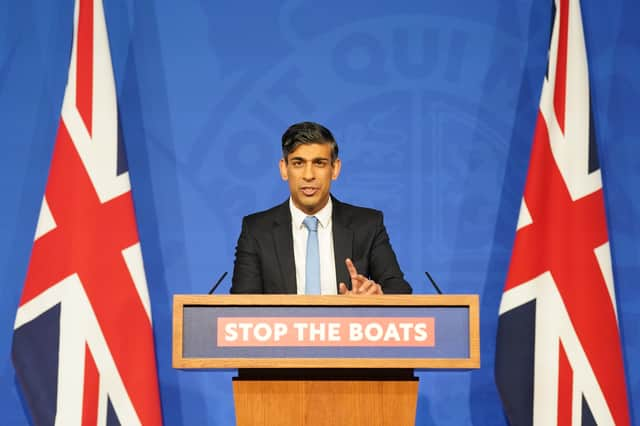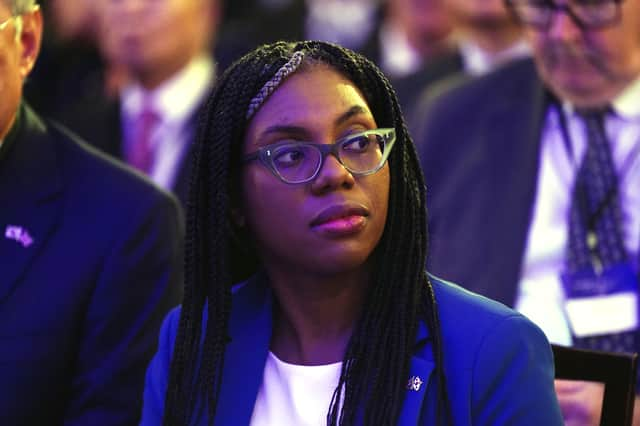UK-India FTA: Rishi Sunak will have to choose between migration crackdown or trade deal, expert says
and live on Freeview channel 276
Rishi Sunak will likely have to choose between cracking down on legal migration and signing a free-trade agreement with India, an expert has said.
The UK has long been locked in negotiations with the world’s second most populous country to try and secure a trade deal. This was touted as one of the great Brexit benefits, and Liz Truss promised it would get signed before Diwali in October 2022. However, more than a year later it still appears there’s little sign of breakthrough.
Advertisement
Hide AdAdvertisement
Hide AdThe government is desperate to get a trade deal signed before the next election, however this could come at the price of another of Sunak’s priorities - lowering migration. Stephen Hunsaker, author of UK in a Changing Europe’s trade tracker, believes the deal will happen, however the UK may need to make some compromises.
“I know the government really wants it to happen before an election as a positive win on that side,” he told NationalWorld. “I think it’s going to come down to the issue of work visas. India is going to continue to push for more visas for their workers and that’s the benefit they really want to see come out of this.
“That is going to be really hard for this government because they are trying to cut those very historically high [migration] numbers down. Signing something with India that’s going to open up with more [immigration] is going to be a really hard sell to their voters.”
Sunak has made slashing legal and illegal migration the main focus of his time in power. The ONS revealed that net migration to the UK hit a record level in the year to December 2022 of 745,000, 561,000 people higher than pre-Brexit. More than 30,000 people have also crossed the Channel in small boats in the last year.
Advertisement
Hide AdAdvertisement
Hide Ad

The Office for National Statistics today (30 January) predicted that the population of the UK would swell by 6.6 million by the middle of the next decade. Sunak's official spokesman said: "The Prime Minister is certainly of the view that legal migration has been too high – it must come down, and it must come down quickly."
Late last year, Home Secretary James Cleverly announced a raft of measures to reduce legal migration by 300,000, including banning social care workers from bringing in dependents and increasing the salary threshold for family visas. Sunak is also trying to pass his Safety of Rwanda Bill so he can send asylum seekers to the east African country for processing and resettlement.
Hunsaker continued: “It’s going to have to be one of those really difficult things where the government decides which one’s worse - not getting this through or not showing a result. I would be hard pressed to see India not push for work visas and make it part of a free-trade agreement.”
Rishi Sunak’s official spokesman said “discussions are progressing” when asked for an update on the trade deal. He said the government was “continuing talks, we don’t get into the ins and outs”. The spokesman added: “We don’t set deadlines for trade deals, it’s the content that counts.”
Advertisement
Hide AdAdvertisement
Hide Ad

A free-trade agreement with India could have a significant impact on the UK economy. While Australia and New Zealand added minimal value due to having low tariffs already, India’s are very high. According to UKICE, trade with India only makes up 1.73% of the UK total, however Hunsaker believes this would rise with an FTA.
“India has very high tariffs and so the benefit will be more significant there and there will be more opportunity in certain sectors,” he said. “Whether that’s the whisky sector, I know that’s one which would highly benefit - there are tariffs of up to 150% on imports of whisky to India.
“There are certain sectors that would really benefit from a huge market that’s surprisingly pretty untapped by UK businesses, largely because those tariffs are so high.”
However not all areas of the British economy are enamoured with a prospective trade deal with India. Farmers are concerned that any agreement could potentially undercut them in certain areas.
Advertisement
Hide AdAdvertisement
Hide AdLiz Webster, of Save British Farming, a campaign group which wants to return the UK to the single market, told NationalWorld: “The biggest risk overall of an India-UK FTA is divergence from EU regulations. This would ensure hopes of freeing up trade with our biggest market next door become far more arduous and a race to the bottom with an undermining of our high food, animal welfare and environmental standards.”
A recent report by UKICE found that currently the UK is struggling to supplant trade with the EU via new trade deals. Webster, a livestock farmer from Wiltshire, added: “Whilst some small opportunities may arise for British exports of lamb and pork, the threats to other sectors such as cereals and beef is counterproductive and ultimately for food security is deeply irresponsible.”
Last week, talks collapsed between Britain and Canada over a post-Brexit free trade agreement, reportedly around a dispute over imports of hormone-treated beef to the UK. The Business and Trade Secretary Kemi Badenoch declined that talks had “broken down”.
She said: “Trade is very dynamic. There are some issues which we are negotiating and discussing with our partners which we have differences of opinion, and there are others which are going swimmingly. This is not a reason for us to cast aspersions on our trade relationships with those countries.”
Advertisement
Hide AdAdvertisement
Hide AdLabour’s Shadow Trade Secretary Jonathan Reynolds commented: “Rather than strengthening our trading position post-Brexit these failures have left us in a weaker position, particularly for the automotive sector. This is another blow to the British economy because of Conservative incompetence. It is clear that they are unable to deliver what we need to get our economy growing.”
Ralph Blackburn is NationalWorld’s politics editor based in Westminster, where he gets special access to Parliament, MPs and government briefings. If you liked this article you can follow Ralph on X (Twitter) here and sign up to his free weekly newsletter Politics Uncovered, which brings you the latest analysis and gossip from Westminster every Sunday morning.
Comment Guidelines
National World encourages reader discussion on our stories. User feedback, insights and back-and-forth exchanges add a rich layer of context to reporting. Please review our Community Guidelines before commenting.
